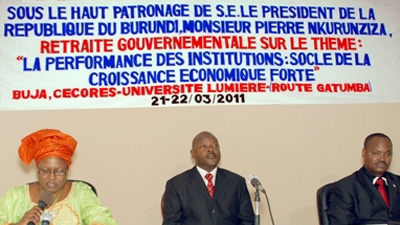The two-day retreat, which took place March 21-22, was a high-level brainstorming session with the active participation of the vice presidents, the entire cabinet and senior advisors at the presidency.
A high-level World Bank delegation to the retreat included the Chief Economist for the Africa Region, Shanta Devarajan, who flew in from Washington, DC; John McIntire, the Dar-es-Salaam-based Country Director for Burundi, Uganda and Tanzania; and the Bank’s Country Manager for Burundi, Mercy Tembon.
“We need to embrace a new mentality and stir behavioral change to run public institutions more efficiently,” the Burundian president said.
Nkurunziza, 47, took the helm of the country in 2005 and recently won another five-year term that began on August 26, 2010. The president says he would like to mark this term with a focus on results for ordinary Burundians.
Burundi, indeed, faces great challenges. About two-thirds of the country’s eight million people live on less than US$1.25 a day; and unless a sharp turn occurs, the country is unlikely to meet most of the benchmarks of the Millennium Development Goals by 2015. However, progress on some of the goals –such as gender parity – has been remarkable.
Accordingly, the cabinet retreat was framed around three priority areas: economic growth; public finance and fiscal space; and governance. It allowed the government to sketch out a roadmap that will enable line ministries to provide prompt and realistic solutions to the problems confronting Burundians.
Inspired by the support of the Rapid Results Approach under the leadership program at the World Bank Institute, members of government ended by committing to design and implement an Action Plan in each of their ministries within a 100-day deadline.
The World Bank’s Devarajan encouraged the authorities to act on their pledge. He explained that the better a country’s performance, the more resources it gets from the World Bank and other sources.
“When you think about ways to improve institutional performance, you come to the realization that good governance is a critical first step,” he said.
“Burundi is now at a crossroads of its history, facing two major challenges,” Tembon said. “Firstly, to consolidate the hard-won peace by promoting accelerated and shared economic growth, and secondly, to ensure the competitiveness of its economy in the sub-region.”
“Burundi’s return to peace offers a chance for its reconstruction, but this in turn calls for reforms that would help build capable institutions, which this cabinet retreat appropriately seized,” McIntire said.
“A culture of results has been taking root in Burundi for some time now, and this cabinet retreat reaffirmed a commitment to that spirit of change, at a time when scarce external funding is increasingly devoted to only those countries that produce concrete development results,” added Tembon.
The World Bank’s new Africa strategy, adopted in early March, makes job creation and economic competitiveness one of the two pillars of the Bank’s support to the continent. The second pillar – vulnerability and resilience – is particularly applicable to a post-conflict country like Burundi, while the strategy’s foundation – governance and public sector capacity – resonates with the many issues discussed during the cabinet retreat.
To implement the strategy, the Bank will rely on partnerships – with governments, citizens, the private sector, civil society, other donors, etc. – and on its vast repository of development knowledge. Shifting the focus away from funding, the Bank would like its concessional financing from the Inte0rnational Development Association (IDA) to be used to leverage private capital. For a country like Burundi the payoff could be monumental.
The World Bank portfolio in Burundi consists of 14 active projects in sectors as diverse as agriculture, health, education, energy, water, transport, community and rural development, demobilization and reintegration, public works, private sector development, economic management, and public finance management. The total commitment as of April 2011 was just below $440 million.

